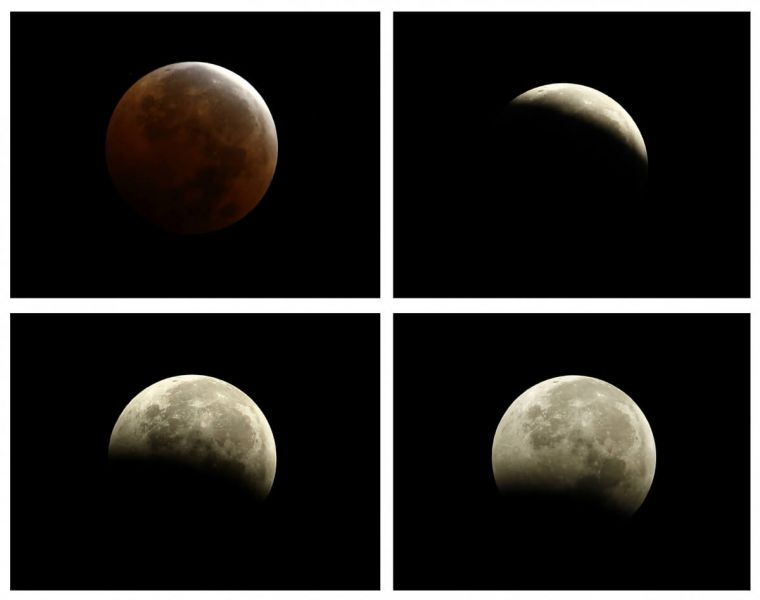Blood moons and the end of the world: How not to interpret biblical prophecy

"The sun shall be turned into darkness, and the moon into blood, before the coming of the great and awesome day of the Lord."
That's according to the prophet Joel (2:31). In recent months the prophecy has provided Christian interpreters with vastly increased book sales, frequent TV appearances and even a movie. John Hagee's Four Blood Moons:Something Is About To Change (2013) and Mark Blitz's Blood Moons:Decoding the Imminent Heavenly Signs (2014) both link biblical prophecies, lunar eclipses and historical events.
Hagee, a well-known Christian Zionist, predicts dramatic though unspecific developments connected with Israel, while according to Blitz we are to expect the Second Coming of Christ this autumn. (An unseemly spat between the two developed, with Blitz's publisher accusing Hagee of plagiarism.)
Hagee says that a series of "tetrads" – four consecutive lunar eclipses – took place at significant moments in history, each time at the Jewish festivals of Passover and Tabernacles. He instances 1493-94, a year after the expulsion of the Jews from Spain, 1949-50, the year before the foundation of the State of Israel, and 1967-68 – the Six Day War occurred between the first and second eclipses. The next one is due shortly, on September 28 during the Feast of Tabernacles.

It is fair to say that the claims of Hagee and Blitz have been comprehensively rubbished by astronomers, biblical scholars and theologians. The former General Secretary of Christian Witness to Israel, Mike Moore, wrote a useful article debunking their theories. Among other things, Moore points out that Hagee has coined the description "blood moons" for dramatic effect and that while the moon does occasionally turn red because of atmospheric conditions, it doesn't necessarily happen during an eclipse. Furthermore, the eclipses haven't even been visible over Israel, and the link to historical events is a bit patchy. Not only that, but there have been plenty of tetrads during Passover and Tabernacles during which nothing of signficance in Jewish history happened at all.
Hagee and Blitz are set to join a long, long list of Christian preachers who have attempted to map world events on to their interpretation of what they imagine to be biblical prophecy. In 999 AD there was a minor panic as the end of the first millenium approached, with numbers of wealthy people giving their possessions to the Church in an attempt to ensure they were on the right side in the coming cataclysm. In 1346 the Black Death spread across Europe, killing a third of the population; it was regarded as a harbinger of the end times. The 17th century Baptist Benjamin Keach prophesied that the world would end in 1689, while the Methodist co-founder Charles Wesley plumped for 1794. Jehovah's Witnesses predicted it on various dates, reinterpreting it each time when it didn't happen. Most recently, evangelist Harold Camping predicted the Second Coming on May 21, 2011.
But what effect do these predictions have?
Sir Isaac Newton, far better known as a scientist and mathematician, became obsessed in later life with studying the books of Daniel and Revelation and wrote copiously on their meaning. He estimated that the world would end no earlier than 2060. However, he said: "This I mention not to assert when the time of the end shall be, but to put a stop to the rash conjectures of fanciful men who are frequently predicting the time of the end, and by doing so bring the sacred prophecies into discredit as often as their predictions fail."
Newton's criticism of 17th-century Hagees and Blitzes seems bang on the money. The long parade of failed interpreters shows no sign of ending any time soon. And the trouble is, he was right: when the world doesn't end this autumn, when more 'blood moons' come and go with nothing out of the ordinary happening, "the rash conjectures of fanciful men" will "bring the sacred prophecies into discredit".
The book of Revelation – and similar biblical writings like Daniel in the Old Testament and passages in Matthew's and Mark's Gospels and 2 Thessalonians in the New – has puzzled readers for millenia. Martin Luther, the Protestant Reformation pioneer whose views about all sorts of things might shock his devotees today, wanted to get rid of Revelation altogether. "I can in no way detect that the Holy Spirit produced it," he wrote. Referring to Revelation 22:7, he says: "They are supposed to be blessed who keep what is written in this book; and yet no one knows what that is, to say nothing of keeping it." He concludes: "For me this is reason enough not to think highly of it: Christ is neither taught nor known in it."
For orthodox Christians today, dropping books of the Bible because we don't understand them is not an option. So how are we to read this kind of writing?
1. Understand that God does not play mind games. He isn't a cosmic crossword compiler, who's inspired books full of riddles that can only be understood by especially gifted and talented expositors. The Bible is for every Christian, not just for the privileged few. If someone claims to have discovered something entirely new, they're probably wrong.
2. Read these writings on their own terms. This is a kind of literature called 'apocalyptic', from the Greek word for 'revelation'. It is highly symbolic, presenting truth in images rather than arguments. It deals with events current at the time the books were written, broad-brush spiritual treatments of the battle between good and evil, and God's coming re-formation of the world when he will "make all things new". They do not provide timetables.
3. Don't try to map what you read about in the newspapers on to Revelation. What you think is "news" is what a journalist decides it is. If you think the Iran nuclear deal or the rise of Islamic State are something to do with biblical prophecy, just be aware that there are lots of things happening in the world right now that are just as relevant, or irrelevant. It's just that you don't happen to know about them. All through history people have tried to do the same thing, and they've all been wrong.
4. Don't believe Martin Luther. Christ is in all of the Bible and he is definitely in Revelation. Not just in the great set pieces like chapter 1 and chapter 5, either: Revelation, written in a time of terrible tribulation, presents the ultimate victory of Christ over all the powers of this world.
5. Read these books for what they say to the Church and the world today. If apocalyptic literature only dealt with future events – which have still not taken place – then for almost every Christian who's ever lived, there'd be no point in reading them. So look for the eternal truths in what they say, and leave the rest to God. When Harold Camping realised he'd been wrong, he said that his attempts to predict a date for the end of the world had been "sinful". He added that he was now searching the Bible "even more fervently...not to find dates, but to be more faithful in [his] understanding". That's wisdom, hard won and almost too late; Camping died not long afterwards.
6. Read them humbly and prayerfully. Revelation is full of wisdom and spiritual treasure, but it has led many people badly astray. Some of what it contains will remain dark "until we see face to face". Some of the rest is gloriously inspirational. Some of it provides a powerful critique of the state and its limitations. Some of it dramatises the spiritual struggle agains the forces of darkness. Beyond that, we should be very wary of seeming too certain.
Follow @RevMarkWoods on Twitter.











